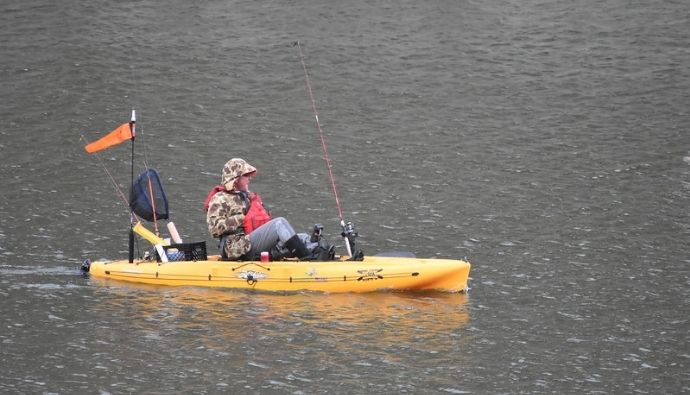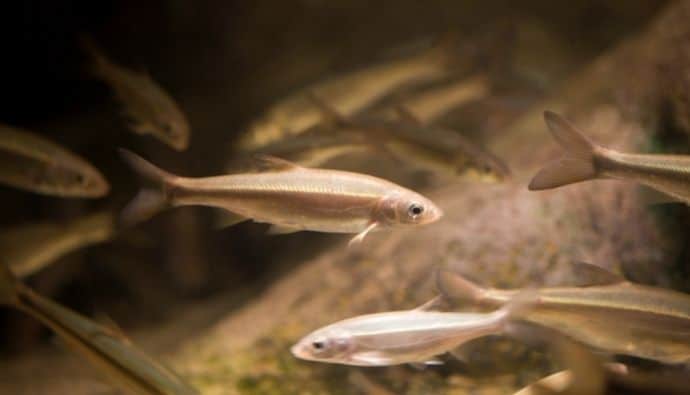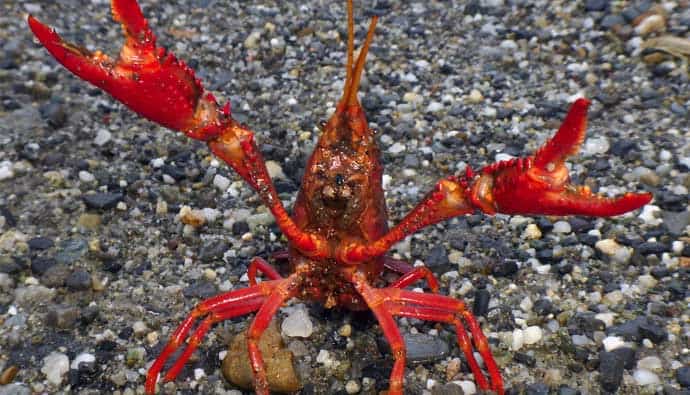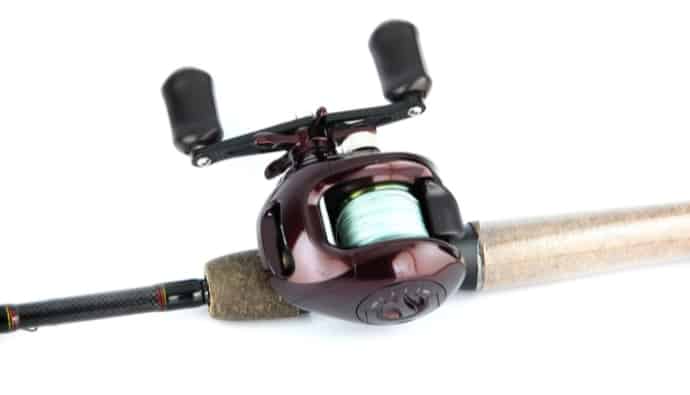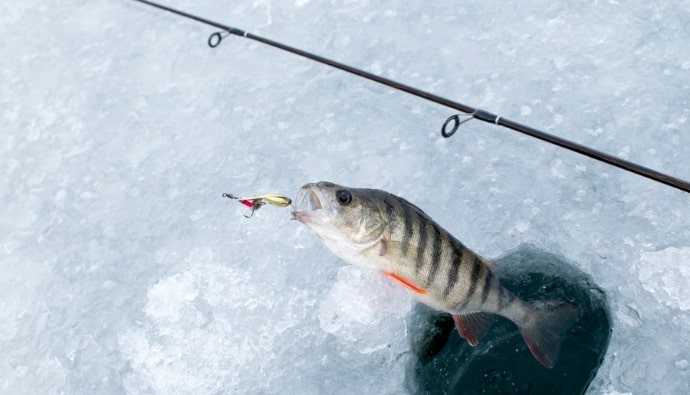Weather is one of the crucial factors that will decide your fishing strategy. Understanding how weather and fishing come hand-in-hand increases your chance of success.
Your chances of catching fish after rain or a rain storm can go either way. Do you know why? Fish feel when their environment changes. They can sense changes in water, barometric pressure, and oxygen levels. These factors can alter how fish behave and react to you as an angler fishing in their waters.
So without further ado, here are tips and facts you should know if you’re wondering, “is it good to go fishing after it rains?”
How Do Water Temperature and Air Pressure Affect Fishing?
Your success in bass fishing after rain in pond fishing depends on the air pressure and the water’s temperature.
Effects of Weather Fronts (Atmospheric & Barometric Pressure)
Drops in atmospheric pressure usually happen when a cold front (or rain) is coming. As the pressure drops, it pushes air bubbles to the surface of the lake or river. Tiny organisms and plant matter rise up with these bubbles. Fish follow them to feed, which is perfect for bass fishing.
Once a cold front passes, our luck in fishing usually declines. It is because barometric pressure increases after a storm. It makes fish feel lethargic and less likely to bite. With decreased activity, they might stay away from the surface.
Effects of Water Temperature
Many experienced anglers know that temperature can change how fish react and behave. If you’re looking for a good catch on your fishing trip, you need to learn how it affects your catch.
The fish’s metabolism increases in warm waters. This increases their breathing rate, thus increasing their need for oxygen. These conditions make for the most active bass and other fish. But, when the water is chilly, their metabolism slows, and they become less active.
In warm water that experienced a season of warm rain, bass and other fish species will become more active. This is an angler’s dream combination of conditions for bass fishing in a lake or river.
Warm or chilly weather followed by freezing rain is unfavorable for fish. Thus, they become less active.
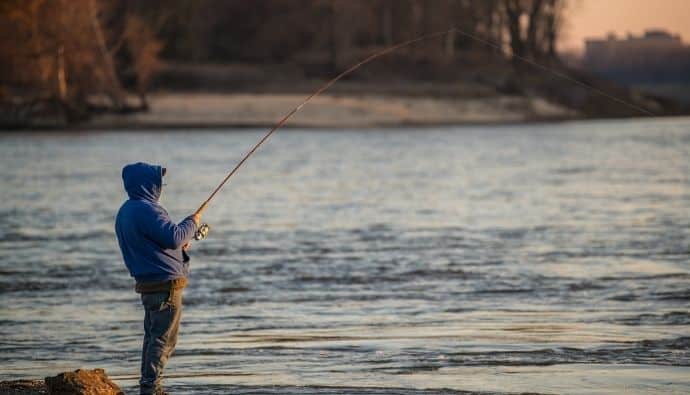
How Does the Intensity of Rain Affect Fishing?
Heavy rain can affect your fishing experience. Rain intensity can impact water levels, clarity, and patterning of fish. These factors combined can help you decide if it’s worth getting in a boat for. But if you’re wondering, yes, fish bite in the rain.
Water Level
When it comes to water level, the amount of rainfall determines how much runoff a body of water receives. Heavy rain can cause the runoff to carry worms and other critters to the river. When the ground can no longer hold water and lets the water flow to a lake or river, it generates runoff.
The areas with large runoffs have the strongest currents. These strong currents mean more turbulence, meaning there is more oxygen there. This attracts fish as they need this for metabolism.
Water Clarity
Heavy rain affects the clarity of the waters in a lake or river. You will most likely find mud lines where runoff mixes with the clear water.
This muddy water sometimes brings worms and grubs that attract baitfish, but only if the rain is warm. This will let you catch bass, trout, and other fish as they go into a feeding frenzy. If the runoff is from melting snow or freezing rain, fish tend to seek warmer water temperatures.
When the water is cloudy, smaller fish also have a hard time spotting the big ones looking to eat them.
Fish Patterning
Rain strength will also affect the patterning of the fish. Patterning pertains to fish behavior and normal feeding patterns. When fresh water coming from outside enters the main body of a lake or river, fish tend to migrate to its point of entry. This is because this spot tends to have more oxygen and food.
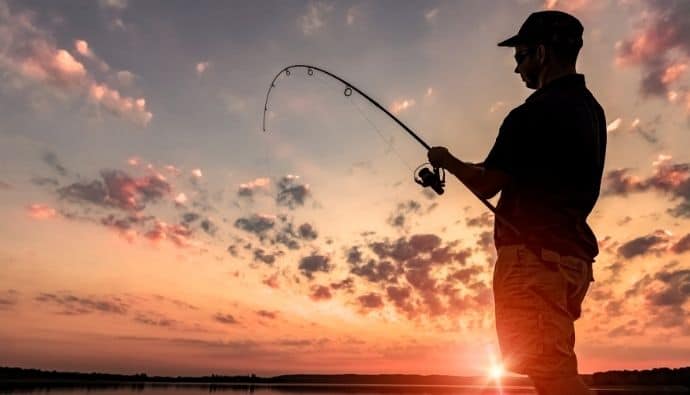
Things to Keep in Mind When Fishing After the Rain
Most people recommend going fishing before a cold front or rain storm comes. Sometimes though, you might have a better chance of making a catch after the cold rain.
If there’s been a long spell of hot and arid weather, such cases can make catching fish might be better after rain.
Why?
This kind of weather means less food on the surface, thus, activity from the fish. A downpour can cool down the surface to attract insects. It can also agitate the water to bring the organic matter to the top. Both these factors mean more fish will be present on the surface to feed.
Here are some reminders for your next fishing trip to get that prize catch even after a downpour.
Choose Lures Wisely
Once the rain passes, the water in the river or lake stirs and impacts its clarity. In clearer water, fish can spot any lures and baits and shy away. This presents an opportunity to use a more diverse range of lures, as fish will not spot them right.
Fish are also slow after heavy rain, so it’s best to go fishing with a vertical lure and bait. I prefer to use jigs, salamanders, or plastic worms (there are several types of plastic worms for you to choose from) in these situations.
Find Feeder Creeks
Finding fish post-downpour can be easy if you keep an eye out for feeder creeks. Feeder creeks are the runoff area where the land is pumping new rainwater into the lake or river.
This area will be oxygen-rich, which will draw plankton and fish. The temperature of the water will also be different there, which attracts fish.
Watch the Clouds
After the rain storm or rain passes, what follows is usually a period of brightness from the sun. These bright conditions will triggerfishes like bass and trout to dive into deeper water and find shade. It’s optimal to fish while the skies are still overcast.
During this period, the water will still be cold, and the skies will still be dark. Fish will be less likely to gather away from the sun and seek deep or muddy water.
Suppose the rain is about to stop, with a little drizzling here and there. So, you thought it would be okay to set out for some lake fishing. But first, watch the clouds for lightning and thunder.
This way, you don’t end up like the two men from Fort Myers, Florida. Lightning struck their rod as they were fishing in the Caloosahatchee River. Luckily, none of them got hurt.
Does Rain Affect Saltwater Fishing? Yes, it does, in the same way, rain affects freshwater fishing.
Final Thoughts
Fishing success after rain relies on temperatures, barometric pressure, and oxygen levels. The rain’s intensity is also something to consider. It might not be the best time to go fishing after a round of chilly rains.
Fishing after warm rains is better since the fish will have a more significant metabolism. This will urge them to go find clearer water ends to feed.
Heavy rain enhances runoff, which transports microorganisms to bodies of water. This supplies food for the fish while increasing oxygen levels.
As a result, the fish migrates to fresh and clear water, with more oxygen and food. So, fishing after it rains is also good as long as you observe other factors.



 Facebook
Facebook YouTube
YouTube